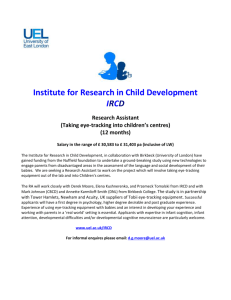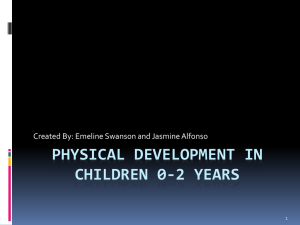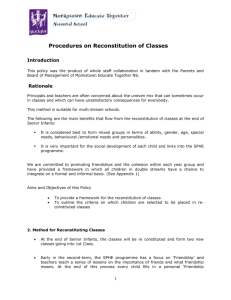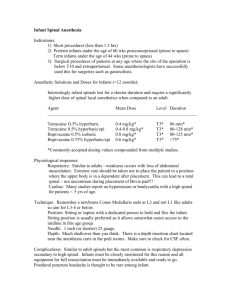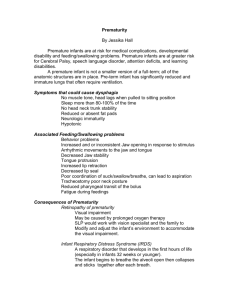References - Jobs at UEL - University of East London
advertisement
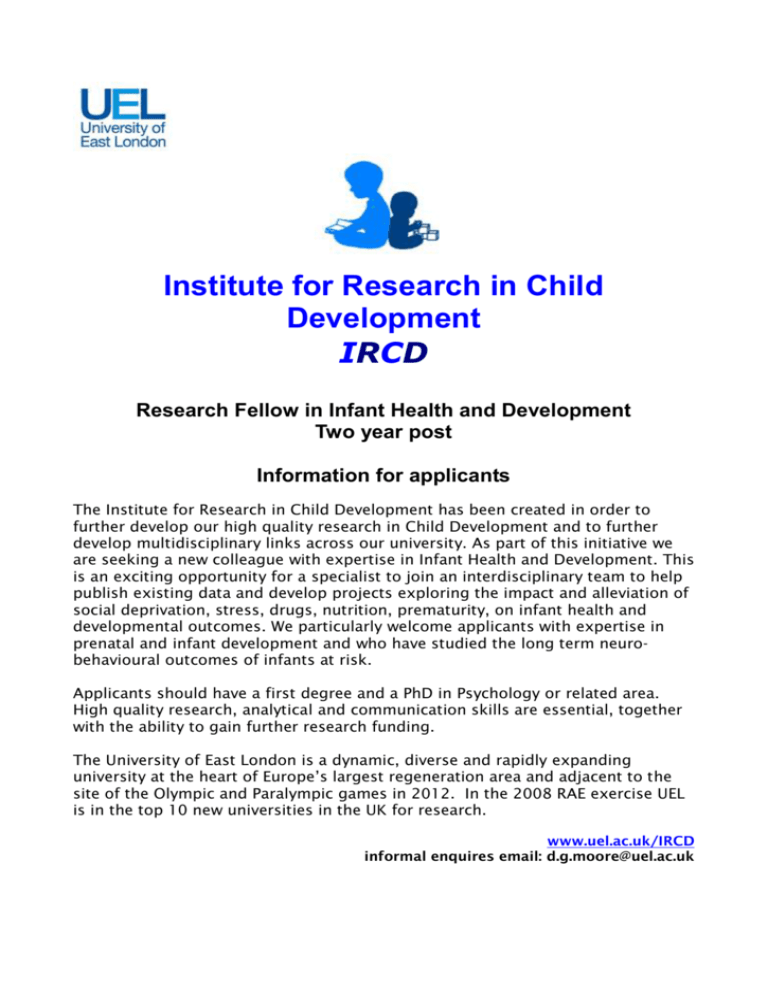
Institute for Research in Child Development IRCD Research Fellow in Infant Health and Development Two year post Information for applicants The Institute for Research in Child Development has been created in order to further develop our high quality research in Child Development and to further develop multidisciplinary links across our university. As part of this initiative we are seeking a new colleague with expertise in Infant Health and Development. This is an exciting opportunity for a specialist to join an interdisciplinary team to help publish existing data and develop projects exploring the impact and alleviation of social deprivation, stress, drugs, nutrition, prematurity, on infant health and developmental outcomes. We particularly welcome applicants with expertise in prenatal and infant development and who have studied the long term neurobehavioural outcomes of infants at risk. Applicants should have a first degree and a PhD in Psychology or related area. High quality research, analytical and communication skills are essential, together with the ability to gain further research funding. The University of East London is a dynamic, diverse and rapidly expanding university at the heart of Europe’s largest regeneration area and adjacent to the site of the Olympic and Paralympic games in 2012. In the 2008 RAE exercise UEL is in the top 10 new universities in the UK for research. www.uel.ac.uk/IRCD informal enquires email: d.g.moore@uel.ac.uk Background The Fellow will be based in the Institute for Research in Child Development (IRCD) and will work to build and consolidate our thematic program in Child health, wellbeing and risk and develop further inter-disciplinary links between the IRCD and the Institute for Research in Health and Human Development (IHHD). The Fellow will work closely with Prof Moore, Dr Kushnerenko, Dr Edmonds and Dr Tomalski in IRCD, linking with Professors Harden and Renton from IHHD. The RF will be joining a vibrant and well connected interdisciplinary research group with opportunities for continued development. IRCD have regular seminars and our work is of high quality and highly cited. We have a record of gaining significant external health-related funding for our research (from NiH and Wellcome trust). This appointment will aid in the development of further interdisciplinary links between these ‘flagship’ UEL institutes. See: www.uel.ac.uk/IRCD www.uel.ac.uk/ihhd IRCD members have published highly-cited, high impact studies of the neurobehavioural outcomes of infants and children who were: born prematurely; born with low birth weight, exposed to drugs in utero; born with Down syndrome; or exposed to aluminium in their feed [1-14]. IRCD members have considerable expertise in longitudinal studies of neurobehavioral outcomes in children and developing new methods for studying infants [15-24]. These studies have shown differential cognitive, behavioural and neurological outcomes in infants and have significant theoretical and policy implications. This work has informed recent projects developing early screening batteries for infants from populations of mothers living in areas of significant deprivation in London [see 25-26]. IRCD members have active collaborations with colleagues in institutions with international reputations in child development and child health, including the Institute for Child Health, Case Western Reserve University, Developmental Psychopathology Research Unit, Tavistock Centre, The Centre for Brain and Cognitive Development, Birkbeck University. IRCD has a purpose built Babylab and 128 channel EEG lab The appointee will expand and strengthen this area of work within UEL and aid in the development of collaborations with the Homerton and Newham University Hospital trusts most notably in partnership with Harden (IHHD) who in her joint UEL-Newham post is developing research around improving health and reducing health inequalities in women and children in East London [see 33-34]. In sum, the purpose of the fellowship will be to a) build interdisciplinary links in child health and development b) maximise the use of the existing datasets collected by IRCD and collaborators to produce high quality outputs c) develop new projects and secure external funding to build on the findings of these studies. Description of program of work As outlined above, the focus will be in maximising the outputs from existing data and in the development of funding applications for inter-disciplinary work in the area of environmental risk and infant health and development outcomes; building links between IRCD, IHHD and external collaborators. Specific projects from which the RF may develop spin-off work and contribute to outputs are the following: The impact of drugs on infant neurobehavioral outcomes (The DAISY Study) The Daisy study was funded by NIH and the data collection was completed in 2008. We have important longitudinal data on the development of a unique cohort of infants exposed to a mixture of recreational drugs in utero, including the first ever outcome data on the in utero effects of Ecstasy (MDMA) The RF will aid in the continued analysis and write up of this work, and, in close coordination with our collaborators at Case Western in the US, develop further spin-off proposals. There are a number of high profile papers published and in preparation from this study [9,12-14]. The RF will facilitate in the continued write up and submission of this work as well as contributing to the development of new project proposals. The impact of prematurity, nutrition and birthweight on infant neurobehavioral outcomes Kushnerenko has considerable expertise in assessing neurobehavioral (EEG) outcomes in low birth weight and premature babies with many high impact papers in this area [2,8,15-19,21,27]. This work has led to promising collaborations with colleagues in Finland, Hungary and the Netherlands. Edmonds also has expertise in the impact of pre-maturity, nutrition and hydration on longer term outcomes in children [see 3-7,28-29],and has strong collaborative links with the Institute for Child Health. The RF will work to further develop these related areas of work. Impact of multiple deprivation and low SES on infant neurobehavioral outcomes (The ELAS study) This study is utilising EEG and eye-tracking methods to detect early difficulties in language, attention and social development in infants from low SES backgrounds. We have developed a highly important collaboration with Johnson and KarmiloffSmith from the world renowned Centre for Brain and Cognitive Development. The RF will contribute to a research area in which there is a huge potential to expand and develop. We have already gathered significant pilot data showing the impact of SES-related factors on early brain activity in infants and there are a number of high impact papers already in preparation and planned [see 25-26,30-32]. Impact of poor antenatal care and health inequalities on neuro-cognitive outcomes The post will formalise links with the work of Harden in IHHD, who in her jointly funded post with Newham University Hospital Trust is developing a programme of research linked to improving health and reducing inequalities in health, focusing in particular on issues around ethnicity and teenage pregnancy [33-34]. This includes a new NIHR Programme Development Grant to explore issues around access to antenatal care. One of the challenges for this area is in bringing better and more detailed outcome measures to bear so we can better assess the impact of health inequalities and the effects of interventions designed to tackle health inequalities. IRCD are already working with IHHD in the area of children and public health in the Well London Study [see 35] and the RF will develop the existing links between IRCD expertise in the area of neuro-developmental outcomes, and IHHD expertise in public health, community interventions, health prevention and health policy. Thus, a key program of work for the RF will be in developing projects that utilise neurobehavioral methods for studying the long term outcomes of infants at risk and that tie in with NIHR and NHS agendas. References 1. 2. 3. 4. 5. 6. 7. 8. 9. Cebula, K, Moore, D.G. & Wishart, J. (2010) Social Cognition in Children with Down’s Syndrome: Challenges to Research and Theory Building. Invited Review. Journal of Intellectual Disability Research, 54, 113-134 Ceponiene, R., Kushnerenko, E. , Fellman, V., Renlund, M., Suominen, K., & Naatanen, R. (2002). Eventrelated potential features indexing central auditory discrimination by newborns. Cognitive Brain Res, 13, 101-113. Fewtrell, M.S., Bishop, N.J., Edmonds, C.J., Isaacs, E.B. & Lucas, A.L. (2009). Aluminium exposure from intravenous feeding solutions and later bone health: 15 year follow-up of a randomised trial in preterm infants. Pediatrics, 124, 1372-1379. Edmonds, C.J., Gringras, P., Rogers, M., Lanigan, J., Singhal, A., Lucas, A., Denton, J., & Isaacs, E.B. (in prep.). Executive Functions in children born preterm. Edmonds, C.J., Isaacs, E.B, Cole, T.J., Rogers, M., Lanigan, J., Singhal, A., Gringras, P., Denton, J., & Lucas, A. (under revision). Effects of birthweight on cognition in childhood: a monozygous twin study. Pediatrics Isaacs, E.B., Edmonds, C.J., Chong, W.K., Lucas, A., Morley, R., & Gadian, D.G. (2004) Brain morphometry and IQ measurements in preterm children. Brain, 127, 2595-2607. Isaacs, E.B., Edmonds, C.J., Lucas, A. & Gadian, D.G. (2001). Calculation difficulties in children of very low birthweight: a neural correlate. Brain, 124, 1701-1707 Mikkola, K, Kushnerenko, E., Partanen, E., Serenius-Sirved, S., Leipäläa, J., Huotilainen, M., Fellman, V. (2007) Auditory event-related potentials and neurocognition of preterm children at five years of age. Clin Neurophysiol. 118(7):1494-502 Moore, D.G., Goodwin, J.E., Toplis, A.S., Axelsson, E.L., Braddick, F.M.B., Turner, J.J.D., Parrott, A.C., Singer, L.T., Fulton, S. (in preparation) 10. 11. 12. 13. 14. 15. Infants exposed to MDMA in pregnancy show greater self comforting behaviours in face-to-face and still-face contexts: indications of increased anxiety? Child Development Moore, D.G., Oates J.M., Goodwin, J.E., & Hobson, R.P. (2008). Behaviour of infants with Down syndrome and their mothers in the still-face paradigm. Infancy 13(1), 75-89 Moore, D.G., Oates, J.M., Hobson, R.P. and Goodwin, J.E. (2002) Cognitive and social factors in the development of infants with Down syndrome. Down Syndrome Research and Practice. vol 8, p43-52. Moore, D.G., Turner, J.J.T. et al (in press) In-utero exposure to Ecstasy (MDMA) and Methamphetamine (MA): preliminary findings, limitations and predictions. Invited chapter for Philip Preece and Ed Riley (Eds). The price for the child. Exposure to foetal teratogens and long-term neurodevelopmental outcome. Moore, D.G., Turner, J.J.T., Parrott, A.C, Goodwin, J.E., Fulton, S.E. Min, , M.O., Fox, H.C., Braddick, F.M.B., Toplis, A., Axelsson, E.L., Lynch, S., Ribeiro, H.,Frostick, C.J. & Singer L.T. (in press) During pregnancy, recreational drug-using women stop taking ecstasy (MDMA) and reduce alcohol consumption but continue to smoke tobacco and cannabis. Journal of Psychopharmacology Singer, L.T., Fulton, S, Moore, D.G., Goodwin, J.E., Toplis, A.S., Axelsson, E.L., Braddick, F.M.B., Turner, J.J.D., & Parrott, A.C. (in preparation) Neonatal reflexes and activity in infants exposed to recreational drugs (including MDMA) during pregnancy. Csibra, G., Kushnerenko, E., & Grossmann, T. (in press). Electrophysiological methods in studying infant cognitive development. To appear in C. Nelson & M. Luciana (Eds.), Handbook of Developmental Cognitive Neuroscience (2nd Edition) MIT Press, Cambridge, MA. 16. Kushnerenko E, Teinonen T, Volein A, Csibra G. (2008) Electrophysiological evidence of illusory audiovisual speech percept in human infants. Proc Natl Acad Sci U S A. 2008 105(32):11442-5. 17. Kushnerenko, E., Johnson, MH (2010) The Newborn Behavior. In Lagercrantz, H. Hanson, M., Peebles, Ment, & Evrard, P (Eds) The Newborn Brain: Neuroscience and Clinical Applications (2nd Edition) 18. Kushnerenko, E., Ceponiene, R., Balan, P., Fellman, V., Huotilainen, M., & Naatanen, R. (2002). Maturation of the auditory event-related potentials during the 1st year of life. NeuroReport, 13, 47-51 19. Kushnerenko, E., Winkler, I., Horváth, J., Näätänen, R., Pavlov, I., Fellman, V., et al. (2007). Processing acoustic change and novelty in newborn infants. European Journal of Neuroscience, 26(1), 265–274. 20. Moore, D.G., Goodwin, J.E., & Oates, J.M. (2008) A modified version of the BSID-II scales for cognitive matching of infants with and without Down syndrome. Journal of Intellectual Disability Research 52(6), 554-561. 21. Sambeth, A., Huotilainen, M., Kushnerenko, E., Fellman, V., & Pihko, E. (2006). Newborns discriminate novel from harmonic sounds: A study using magnetoencephalography. Clin Neurophysiol, 117(3), 496-503. 22. Tomalski, P., Csibra, G., & Johnson, M. H. (2009). Rapid orienting toward face-like stimuli with gaze-relevant contrast information. Perception, 38(4), 569-578. 23. Tomalski, P., Johnson, M. H., & Csibra, G. (2009). Temporal-nasal asymmetry of rapid orienting to facelike stimuli. Neuroreport, 20(15), 1309-1312. 24. Winkler, I., Kushnerenko, E., Horvath, J., Ceponiene, R., Fellman, V., Huotilainen, M., et al. (2003). Newborn infants can organize the auditory world. Proc Natl Acad Sci U S A, 100(20), 11812-11815. 25. Tomalski P. & Johnson M.H. (in press). What are the effects of early adversity on the adult and developing brain? Current Opinion in Psychiatry. 26. Tomalski, P., Kushnerenko, E. Ribeiro, H., Johnson, M.H. & Moore, D.G. Infant resting brain EEG activity and its relationship to family socioeconomic status in a sample of lowSES families from East London. Developmental Neuropsychology 27. Leipälä, J., Partanen, E., Kushnerenko, E., Huotilainen, M., Fellman, V. (Submitted) Perinatal cerebral insults alter auditory event-related potentials. Early Human Development 28. Edmonds, C.J. & Burford, D. (2009). Should children drink more water? The effects of drinking water on cognition in children. Appetite, 52, 776-779. 29. Edmonds, C.J. & Jeffes, B. (2009). Does having a drink help you think? 6–7 year old children show improvements in cognitive performance from baseline to test after having a drink of water. Appetite, 53, 469-472. 30. Kushnerenko, E., Tomalski, P., Ribeiro, H., Potton, A., Axelsson, E., Murphy, E., Moore, D.G. (in preparation) Audiovisual speech integration: Visual attention to mouth articulation affects brain responses in 6-9 month old infants. (in prep) Journal of Cognitive Neuroscience. 31. Tomalski, P., Kushnerenko, E., Moore, D.G Potton, A., Ribeiro, H., Axelsson, E., Murphy, E., Does attention to speaking faces help language development in young children? Developmental Science. 32. Tomalski, P.,Moore, D.G., Kushnerenko, E. Parallel processing of speech and non-speech sound streams in infants and adults indicated by mismatch brain responses. Journal of Cognitive Neuroscience 33. Harden A, Brunton G, Fletcher A, Oakley A (2009) Teenage pregnancy and social disadvantage: a systematic review integrating trials and qualitative studies. British Medical Journal 339: b4254 34. Fletcher A, Harden A, Brunton G, Oakley A, Bonell C (2008) Interventions addressing the social determinants of teenage pregnancy. Health Education 108: 29-39 35. Wall, M, Hayes, R. Moore, D.G. et al (2009) Evaluation of community level interventions to address social and structural determinants of health: a cluster randomised controlled trial. BMC Public Health 9:207 UNIVERSITY OF EAST LONDON JOB DESCRIPTION Job Title : Research Fellow in Infant Health and Development Grade : Research Fellow School/Service : IRCD Psychology Campus : Stratford Responsible to : Director of IRCD Responsible for : Development of existing and new research projects Liaison with : Other members of the IRCD, with Angela Harden in IHHD, and with staff and colleagues in Psychology and other units across the University. JOB PURPOSE To contribute to the development of research initiatives in the area of Infant health and development. To aid in the analysis and publication of existing data and to lead and develop new research projects on the impact and alleviation of social deprivation, stress, drugs, nutrition, prematurity on infant and child health and developmental outcomes. To work with staff from IRCD and IHHD to publish high quality papers and to develop new research ideas and gain further research funding. MAIN DUTIES AND RESPONSIBILITIES To publish original research in prestigious high-impact academic journals based on existing data sets held by IRCD and IHHD To lead the development and submission of research grant proposals with IRCD and IHHD staff on the impact and alleviation of social deprivation, stress, drugs, nutrition, prematurity on infant health and developmental outcomes. To lead and develop a programme of research on the impact and alleviation of social deprivation, stress, drugs, nutrition, prematurity on infant and child health and developmental outcomes. To work with IRCD and IHHD staff to coordinate research efforts across the university. To help and support other researchers, including research students, associated with the Institute. To engage in other research activities as determined by the Director of the Institute for Child Development. To contribute to the reputation of the Institute for Research in Child Development by the pursuit of research of high standing. UNIVERSITY OF EAST LONDON PERSON SPECIFICATION Post: Research Fellow in Infant Health and Development Grade: RF School: IRCD Psychology EDUCATION QUALIFICATIONS AND ACHIEVEMENTS: Essential criteria: PhD in Psychology, Medicine, Physiology or related area (A,C) Desirable criteria: Masters level expertise in statistics or research methods (A,C) KNOWLEDGE AND EXPERIENCE: Essential criteria: Experience of infant testing research methods (A,I) Experience in studying the impact of early risk factors on immediate or long term health and developmental outcomes.(A,I,P) Knowledge or experience of studying the impact of interventions to ameliorate the impact of early risk factors on child health. (A,I,P) Publications in high quality academic journals (A,I,R) Experience of preparing and submitting grant proposals (A,I) Desirable criteria: Experience of working on interdisciplinary/collaborative projects and success in gaining research funding (A,I) Publication of first or single author papers (A,I,R) SKILLS AND ABILITIES Essential criteria: Administrative and organizational abilities and excellent interpersonal skills (A,I) Ability to organize and undertake research projects (A,I) Ability to work with parents and infants or children from diverse backgrounds(A,I) Desirable criteria: Understanding of new infant assessment techniques and high level understanding of multifactorial statistical analysis (A,I,C) PERSONAL ATTRIBUTES AND QUALITIES: Essential criteria: Abilities to work with a research team, use initiative and flexible approach to work (I) Availability to work some evenings and occasional weekends (I) Commitment to and understanding of equal opportunities issues within a diverse and multicultural environment (I) Criteria tested by: A = Application form C = Certification I = Interview P = Presentation R = Research papers T = Test

